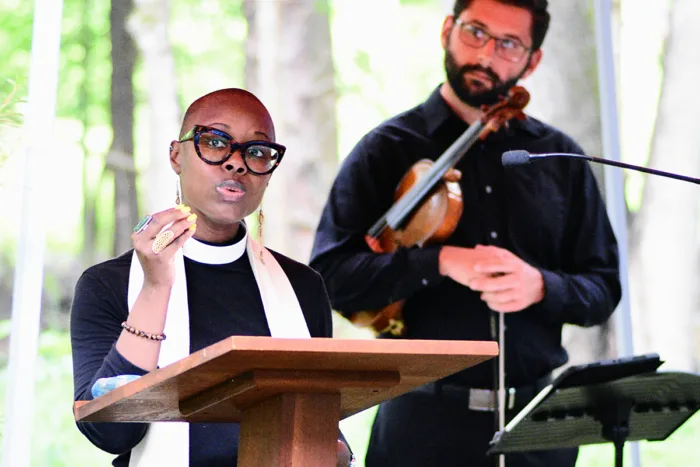
The Rev. Lindsey Ardrey, the canon missioner for diocesan reparations and restitution ministry in the Diocese of North Carolina, speaks on June 19, 2023, during a Juneteenth remembrance service at the McCoy Slave Cemetery hosted by St. Mark’s, Huntersville, North Carolina. Photo: Thomas Tatlow
[Episcopal News Service] In the six months that the Rev. Lindsey Ardrey has been the Diocese of North Carolina’s canon missioner for diocesan reparations and restitution ministry, she has spent most of her time learning the stories of some of the diocese’s 111 congregations as the first step to understanding what harms have been done by slavery and racism, and how they might be repaired.
The heart of her work is relational, she told Episcopal News Service. She started by visiting the diocese’s 11 historically Black congregations, to introduce herself and explain the ministry she has undertaken. From there, she has been meeting with clergy of all congregations to hear what work already has been done in support of racial reckoning, justice and healing.
Bishop Samuel Rodman told ENS that the diocese is building on the racial reconciliation work started under Presiding Bishop Michael Curry when Curry previously served as bishop of North Carolina. It also follows the 2017 churchwide launch of the Becoming Beloved Community framework, which is based on four elements – truth-telling, repairing the breach, proclaiming the dream and walking in the way of love.
In 2022, Rodman said he began inviting congregations to explore their history as the diocese’s next step. “We are offering an invitation to our congregations to do the deep work of truth-telling and exploring our own history, which will lead to conversations and questions around how we make this right,” he said.
He added that North Carolina’s process was informed by the examples set by several other dioceses, including Maryland, Massachusetts, New York, New Jersey and Texas, as well as by Virginia Theological Seminary, in looking honestly at their histories around slavery with an eye toward repairing harms that were done.
To help this work take root in the Diocese of North Carolina, which includes congregations in the middle third of the state, Rodman appointed Ardrey to guide the process. A news release announcing her selection said she would “play a key role in helping the diocese to acknowledge the destructive legacy of slavery and white supremacy within the diocese, and creating a path to justice, restitution and healing so that we may better embody Christ’s beloved community.”
While the work itself isn’t new, Ardrey said she thinks her position, with its emphasis on reparations and restitution, is a first in The Episcopal Church. She said Rodman’s invitation to explore church histories also is taking place at the diocesan level, with archivist Lynn Hoke and the Rev. Brooks Graebner, a historiographer, thoroughly examining the diocese’s role in racism and oppression.
She also has collaborated with the Rev. Kathy Walker, who as the diocese’s canon missioner for Black ministries works directly with the diocese’s historically Black congregations. Walker told ENS that the histories of church buildings across the diocese help tell a larger story about the effects of slavery and segregation today.
“The strange conundrum in this diocese and in places in the South is that during the time of slavery, Black people and white people went to the same church,” she said, even though they sat separately, with enslaved people in the balconies. “But when Jim Crow came along, and segregation became the law of this land, suddenly you have Black churches being built all around the diocese, all around the South, because they no longer could worship together.” Some were created from white congregations, Walker said, and some were built on their own.
For Ardrey, conversations with Rodman and Walker about these histories gave her “a few inclinations” about what reparations might mean in the diocese, but more listening has to come before any action. And while reparations usually involve money, that can’t be where the repair ends. “Money can’t wipe away sin,” she said. “It can’t wipe away the past.”
She also thinks that for white people, the concern about the cost goes beyond potential dollar amounts. “You hear ‘reparations,’ and what comes up is the guilt, the shame, the embarrassment, the ‘Let’s just not talk about it. It’s over. We’ve passed that,’” she said. “But that’s because there’s a cost to yourself, to your identity, to who you proclaim to be, to who you think you are.”
Besides inviting more congregations to be part of this process, Ardrey seeks to have deeper conversations with majority Black churches in the diocese and to ask them “Where does it hurt?” and “What do reparations look and sound like to you?”
She also looks forward to zooming out to explore larger systemic issues, including ones that over time created distrust between Black churches and the diocese. Structures, both physical buildings and the way church governance and operations have been established, play a part. “Perhaps those are scarier for Episcopalians,” she said, “because it’s how we are living our lives.”
–Melodie Woerman is a freelance writer and former director of communications for the Diocese of Kansas.

